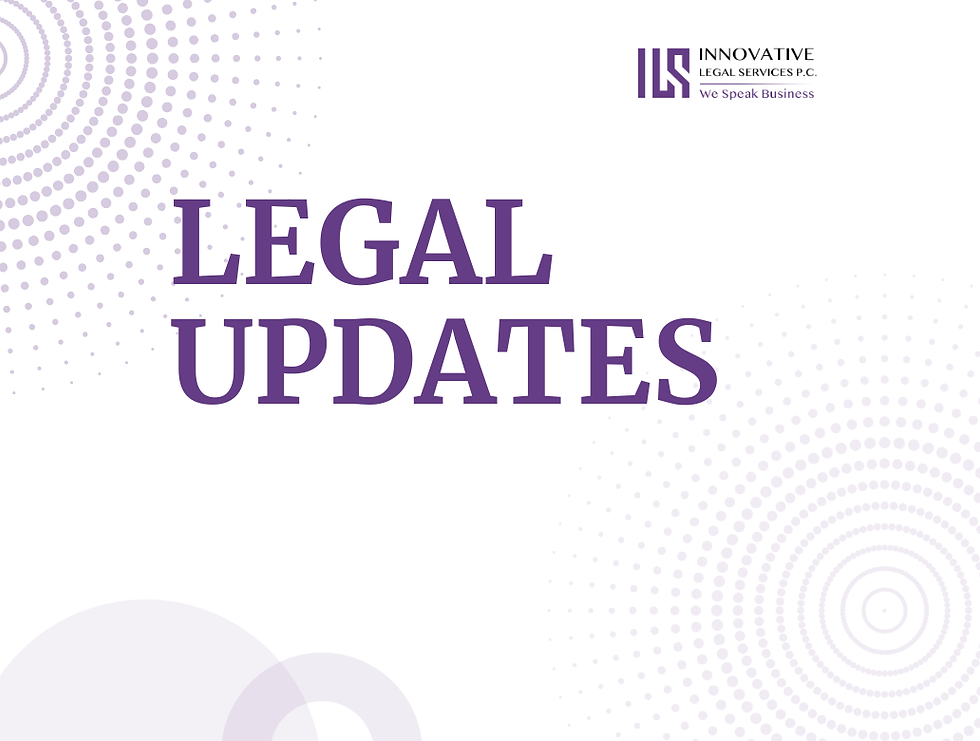Massachusetts Supreme Judicial Court Rules: Retention Bonuses Do Not Qualify as “Wages” Under State Law
- Contact ILS
- Nov 7, 2025
- 4 min read
On October 22, 2025, the Massachusetts Supreme Judicial Court issued a key decision in Nunez v. Syncsort Incorporated, ruling that retention bonuses are not considered “wages” under the Massachusetts Wage Act. For employers, this means that if a bonus is clearly intended for retention purposes and tied to conditions such as continued employment or good standing, it will not trigger the treble-damages penalties imposed for late wage payments.
For guidance on Massachusetts employment contracts, compliance, or retention-bonus structuring, please contact the ILS Legal Team at contact@consultils.com. We provide tailored legal solutions to help employers manage compliance risks and maintain operational stability.
Case Background
Case Origin: After joining the company, the plaintiff’s employer merged with another firm and offered a retention bonus agreement. The agreement stipulated that the employee would receive a fixed bonus in two installments if they remained employed until a specific date, maintained good performance, and complied with normal work expectations.
Plaintiff’s Claim: The employee resigned on the same day the second payment was due, but the employer paid the bonus one week later. The employee argued that this delay violated the Massachusetts Wage Act, claiming the retention bonus should be classified as “wages.”
Initial Ruling: Both the Appellate Division and the Supreme Judicial Court rejected this argument, holding that retention bonuses are not considered “wages” under the statute.
key Legal Reasoning
1. Core Legal Requirements
Under the Massachusetts Wage Act, “wages” are defined as compensation paid solely in exchange for an employee’s labor or services. The statute specifically includes base pay, overtime, vacation or holiday pay, and earned commissions within its scope.
The Wage Act also imposes strict liability on employers who fail to pay such wages on time. Violations can result in triple damages, criminal liability, and personal civil liability for company owners or officers.
By contrast, conditional or discretionary payments—such as stock awards, severance pay, or payouts for unused sick leave—have previously been excluded from the definition of “wages” through case law.
2. Comparison Between the Case and the Statutory Definition
The Court found that the retention bonus in this case was fundamentally different from “wages” as defined under the Massachusetts Wage Act:
Purpose of Payment: The primary purpose of a retention bonus is to encourage continued employment until a specific date, rather than to compensate for services already performed. The right to receive the bonus depends on additional conditions—such as remaining employed until a set date and maintaining satisfactory performance—that go beyond the employee’s normal job duties.
Nature of Compensation: The Court noted that a retention bonus is similar in nature to discretionary stock awards or severance payments, which are also conditional forms of compensation and not included within the statute’s listed categories of “wages.” Therefore, retention bonuses are not subject to the Wage Act’s strict timing and payment requirements.
Employer Implications
As of now, there is no record indicating that the U.S. Supreme Court has accepted this case for review. This ruling has established a clear judicial standard for how Massachusetts courts will handle similar disputes involving retention bonuses, and it is expected to become an important legal reference for employers in the state when drafting or structuring future retention bonus agreements.
Clearer legal boundaries and reduced compliance risk: This decision clarifies that properly structured retention bonuses are not subject to the Wage Act’s treble-damages rule, providing employers with a clear legal foundation.
Lower liability exposure: Employers can design retention bonuses with service-period or performance conditions without fear of automatic wage penalties for delayed payment.
Greater flexibility in incentive design: Companies can tailor retention programs more freely to meet talent-retention needs, knowing the legal boundary is well-defined.
Faster dispute resolution: In future disputes over retention bonuses, employers can rely directly on this ruling as precedent, reducing uncertainty and litigation risk.
Employer Recommendations
To ensure compliance and reduce risk, Massachusetts employers should:
Clarify purpose and nature: State explicitly in retention agreements that the bonus is for continued service, separate from regular wages.
Specify conditions: Include clear terms on required service periods, performance metrics, and conduct expectations.
Define payment timing: Tie payments to service milestones, not regular payroll cycles, to avoid confusion.
Differentiate from commissions or wages: Avoid labeling retention bonuses as “commissions,” which fall under the Wage Act.
Consult counsel: Have legal professionals review agreements to ensure local compliance.
While the Court sided with the employer, it reaffirmed that violations of the Wage Act remain serious. Employers must continue to ensure full compliance for all regular wages and commissions.
For guidance on Massachusetts employment contracts, compliance, or retention-bonus structuring, please contact the ILS Legal Team at contact@consultils.com. We provide tailored legal solutions to help employers manage compliance risks and maintain operational stability.
Disclaimer: The materials provided on this website are for general informational purposes only and do not, and are not intended to, constitute legal advice. You should not act or refrain from acting based on any information provided here. Please consult with your own legal counsel regarding your specific situation and legal questions.
As Managing Partner at ILS, Richard Liu ranks among the leading U.S. attorneys in corporate, employment, and regulatory law. He is known for crafting legal strategies aligned with clients’ business objectives and advising Fortune 500 companies, startups, and executives on corporate transactions, financing, privacy, and employment matters across the technology, healthcare, and financial sectors.
Before founding ILS, Richard practiced at top defense firms, where he developed a reputation for anticipating risks and designing strategies that balance protection with growth. He has secured favorable outcomes in contract and intellectual property disputes, represented clients in state and federal courts, and is recognized for combining large-firm expertise with boutique-firm agility. Richard is also a frequent speaker at industry and legal conferences.
Email: contact@consultils.com | Phone: 626-344-8949



Comments